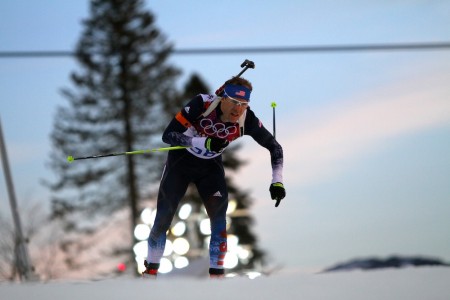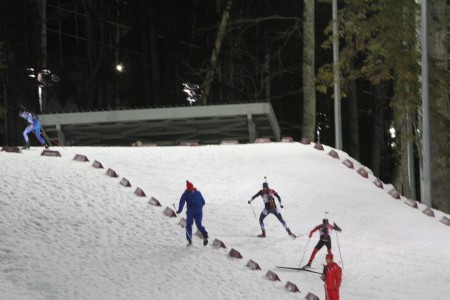
FasterSkier’s coverage is made possible through the generous support of Rudy Project.
SOCHI, Russa – What brought American biathlete Lowell Bailey back from the abyss, after a performance in his second Olympic race here that was so disappointing it left him literally speechless at the finish line?
His mom, he said.
The 32-year-old Bailey had been despondent after Monday’s pursuit race—totally glum. But he was also cognizant that he somehow had to bring his mental state back around in time for another race just three days later.
He accomplished that in Thursday’s 20-kilometer individual race, skiing and shooting to eighth place with the calm and poise that he had been missing earlier this week. The result was the best-ever result for an American man at the Olympics.
Bailey credited the rebound, in part, to his mother, who is here in Sochi, staying in a cramped house down in the valley below the biathlon venue, he said.
She was one of the people he talked to after his frustrating result earlier this week.
“You spend your whole life working for something, then see it fall apart in a matter of 35 minutes. It can really beat you down if you don’t sort of step back,” he said. “When I saw my mom, it kind of broadened my perspective…she came 4,000 miles just to see me race.
“That was kind of the first step towards getting back mentally, and understanding where I was, what this was all about, and what I’m here to do,” he added.
On Thursday, armed with his new focus, and a tuned-up technique to better attack the frustratingly mushy Sochi trails, Bailey put together a performance he could be proud of—hitting 19 of 20 shots, and ranking in the top-20 for his speed on skis.
The single miss was the only thing separating Bailey from a bronze—the second time in this games that just one more hit would have given the American biathletes a medal.
But speaking with reporters after the race, Bailey hadn’t even bothered to consider that alternate outcome.
“There you go: 1:25. So, yeah, it would have been a bronze medal,” he said, gazing at the scoreboard as his time popped up. But, he added: “I think where I can go wrong is when I go out there and start thinking, I need to go out there and win a medal. Versus, I need to go out there and do the best race that I’m capable of. And today, that’s the best race I’m capable of.”
The result came as a relief to Bailey, who had been so low after Monday’s race that the U.S. team’s coach, Per Nilsson, said he presented the biathlete with some statistics to demonstrate that his performance hadn’t been all that bad—and that he could also still do better.
Nilsson cited some pre-Olympic results, and also reminded Bailey of his 90 percent shooting average. Given that Bailey had shot 80 percent during the first two races of the games, that meant that the rest of his races in Sochi should be close to perfect, Nilsson reasoned.
The Americans also spent some time working on ski technique. On Monday, Bailey and Tim Burke, the other top American biathlete, had both struggled in Sochi’s soft snow conditions, which were a change from the typical hard-pack on the international circuit.
“The hills, when they’re so warm like this, get so deep,” Bailey said. “It’s a different style, you know? You have to distribute the power and change the way you ski a little bit.”
On Thursday, Bailey said he started the race at a more deliberate pace, after his bad day earlier in the week.
“I have to say, I was a little gun-shy going into today, because it’s a 20 k. It’s a long race—I really didn’t want to feel that again,” he said, referring to the experience in Monday’s competition. “So, I really tried to work into the race, and ski conservatively, so that I didn’t go under right away.”
He missed one target—the sixth one overall, which was the first in his second round of prone shooting. Bailey said he didn’t dwell on it, though, and he didn’t speculate as to what had caused it.
The miss put him down to into 18th place, but his consistent skiing and shooting over the rest of the race gradually moved him back up.

Bailey said he didn’t realize how well he was doing until he got through his last trip through the range, and headed back out onto the course for one last four-kilometer loop.
On the first climb, heading out of the stadium, he passed Muck Bauer, a German member of the U.S. team’s service staff who generally sticks to his native language.
“He was screaming in German,” Bailey said. “But I heard, ‘top-10.’”
After the finish, Nilsson said he talked to Bailey.
“He said: ‘Finally. This was my third Olympics, and finally I showed that I can perform at the level I have,’” Nilsson said. “I’m so happy for him.”
To top the day off, both Bailey’s and Burke’s performances ended up qualifying them for Sunday’s mass start race, which only has space for 30 men.
Based on Bailey’s results on Thursday, it’s reasonable to think that he could be fighting for a medal in the next race, Nilsson said. But that’s not the way the team approaches things, he added.
“Especially Lowell, if he starts to think about the result goal, then it doesn’t help,” he said.
The right attitude, Nilsson said, is to consider the race to be another day at work, with typical “routine and discipline.”
“That’s the path to success for us,” he said.
Nathaniel Herz
Nat Herz is an Alaska-based journalist who moonlights for FasterSkier as an occasional reporter and podcast host. He was FasterSkier's full-time reporter in 2010 and 2011.




One comment
T.Eastman
February 14, 2014 at 12:22 am
Tremendous effort Lowell! Have fun and do what you know how to do…
Todd